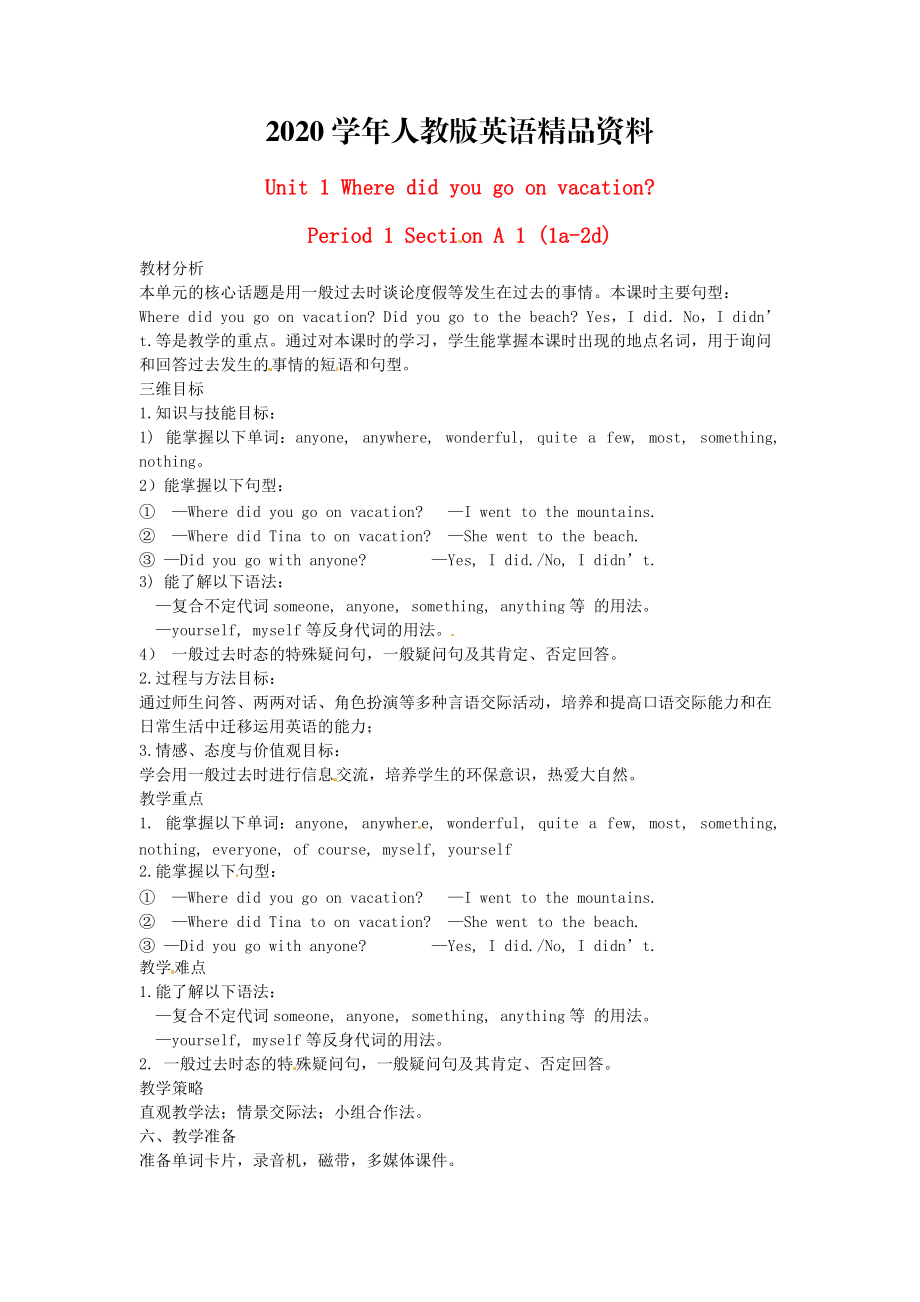《2020八年級(jí)英語(yǔ)上冊(cè) Unit 1 Section A1a2d教案》由會(huì)員分享,可在線閱讀����,更多相關(guān)《2020八年級(jí)英語(yǔ)上冊(cè) Unit 1 Section A1a2d教案(3頁(yè)珍藏版)》請(qǐng)?jiān)谘b配圖網(wǎng)上搜索。
1����、2020學(xué)年人教版英語(yǔ)精品資料
Unit 1 Where did you go on vacation?
Period 1 Section A 1 (1a-2d)
教材分析
本單元的核心話題是用一般過(guò)去時(shí)談?wù)摱燃俚劝l(fā)生在過(guò)去的事情�����。本課時(shí)主要句型:Wheredidyou go onvacation?Didyougotothebeach?Yes�,Idid.No����,Ididn’t.等是教學(xué)的重點(diǎn)����。通過(guò)對(duì)本課時(shí)的學(xué)習(xí)���,學(xué)生能掌握本課時(shí)出現(xiàn)的地點(diǎn)名詞���,用于詢問(wèn)和回答過(guò)去發(fā)生的事情的短語(yǔ)和句型。
三維目標(biāo)
1.知識(shí)與技能目標(biāo):
1) 能掌握以下單詞:anyone, anywhere, won
2���、derful, quite a few, most, something, nothing�����。
2)能掌握以下句型:
① —Where did you go on vacation? —I went to the mountains.
② —Where did Tina to on vacation? —She went to the beach.
③ —Did you go with anyone? —Yes, I did./No, I didn’t.
3) 能了解以下語(yǔ)法:
—復(fù)合不定代詞someone, anyone, something,
3�、anything等 的用法����。
—yourself, myself等反身代詞的用法��。
4) 一般過(guò)去時(shí)態(tài)的特殊疑問(wèn)句����,一般疑問(wèn)句及其肯定����、否定回答���。
2.過(guò)程與方法目標(biāo):
通過(guò)師生問(wèn)答����、兩兩對(duì)話�、角色扮演等多種言語(yǔ)交際活動(dòng)�,培養(yǎng)和提高口語(yǔ)交際能力和在日常生活中遷移運(yùn)用英語(yǔ)的能力�����;
3.情感�、態(tài)度與價(jià)值觀目標(biāo):
學(xué)會(huì)用一般過(guò)去時(shí)進(jìn)行信息交流,培養(yǎng)學(xué)生的環(huán)保意識(shí)��,熱愛(ài)大自然�。
教學(xué)重點(diǎn)
1. 能掌握以下單詞:anyone, anywhere, wonderful, quite a few, most, something, nothing, everyone, of course
4、, myself, yourself
2.能掌握以下句型:
① —Where did you go on vacation? —I went to the mountains.
② —Where did Tina to on vacation? —She went to the beach.
③ —Did you go with anyone? —Yes, I did./No, I didn’t.
教學(xué)難點(diǎn)
1.能了解以下語(yǔ)法:
—復(fù)合不定代詞someone, anyone, something, anything等 的用法��。
—you
5���、rself, myself等反身代詞的用法。
2. 一般過(guò)去時(shí)態(tài)的特殊疑問(wèn)句,一般疑問(wèn)句及其肯定�、否定回答。
教學(xué)策略
直觀教學(xué)法�����;情景交際法�;小組合作法�����。
六、教學(xué)準(zhǔn)備
準(zhǔn)備單詞卡片��,錄音機(jī)�����,磁帶��,多媒體課件�。
七、教學(xué)環(huán)節(jié)
Step1 Warming up and leading in
1.Greeting
T:Good morning����,boys and girls!Nice to see you��!...
2.Leading in
T:What did you do last weekend?Now let’s talk.
看動(dòng)畫(huà)片來(lái)進(jìn)入本課時(shí)的主題談?wù)撋现苣┳?/p>
6、了些什么事情�,談?wù)撨^(guò)去發(fā)生的事情���。
Step 2 Presentation
1. Show some pictures on the big screen. Let Ss read the expressions.
2. Focus attention on the picture. Ask: What can you see? Say: Each picture shows
something a person did in the past. Name each activity and ask students to repeat:
Stayed at home, We
7�、nt to mountains, went to New York City 6. Went to the beach,
visited my uncle, visited museums, went to summer camp
3. Now, please match each phrase with one of the pictures next to the name of the
activity,point to the sample answer.
4. Check the answers. Answers: 1. f 2. b 3. g 4. e 5.
8����、 c 6. a 7. d
Step 3 Listening :1a and 1b
1. Point to the picture on the screen.
Say: Look at the picture A. Where did Tina go on vacation? She went to the mountains.
Ask: What did the person do in each picture?
2. Play the recording the first time.
3. Play the recording a second time.
9�����、
Say: There are three conversations. The people talk about what did on vacation. Listen to the recording and write numbers of the names in the right boxes of the picture.
4. Check the answers.
5. Pair work :1c
1)Point out the sample conversation. Ask two Ss to read the conversation to the cl
10�、ass.
2) Now work with a partner. Make your own conversation about the people in the picture.
3) Ss work in pairs. As they talk, move around the classroom and give any help they need.
4) Let some pairs act out their conversations.
Step 4 Listening:2a and 2b
1. Tell Ss they will hear a conve
11�����、rsation about three students’ conversations. Listen for the first time and fill in the chart. Then listen again and check Yes, or No.
2. Let Ss read the phrases in the chart of 2b.
3. Play the recording the first time. Ss listen and fill in the chart.
4. Play the recording a second time for th
12����、e Ss to check “Yes, I did.” or “No, I didn’t. ”
5. Check the answers with the Ss.
6. Pair work :2c
1) Let two Ss read the conversation between Grace, Kevin and Julie.
2) Let Ss work in pairs and try to role-play the conversation.
3) Ask some pairs to act out their conversations.
Step 5 Ro
13、le-play
1. First let Ss read the conversation and match the people and places they went.
2. Let Ss act out the conversations in pairs.
3. Some explanations in 2d.
Step 6 Summary
What have you learned in this lesson?(讓學(xué)生自己總結(jié)這節(jié)課中學(xué)到了什么。)
Step 7 Homework
用英語(yǔ)詢問(wèn)你的一位好朋友����,她(他)假期去了哪里?看到了什么��?并將此對(duì)話寫在作
14�����、業(yè)上����。
A: Where did you go…?
B: I went to…
A: Did you see…
B: Yes, I did. / No, I didn’t.
八����、板書(shū)設(shè)計(jì):
Unit 1 Where did you go on vacation?
Section A 1 (1a-2d)
anyone, someone, everyone, something, anything, everything
① —Where did you go on vacation? —I went to the mountains.
② —Where did Tina to on vacation? —She went to the beach.
③ —Did you go with anyone? —Yes, I did./No, I didn’t.
 2020八年級(jí)英語(yǔ)上冊(cè) Unit 1 Section A1a2d教案
2020八年級(jí)英語(yǔ)上冊(cè) Unit 1 Section A1a2d教案

